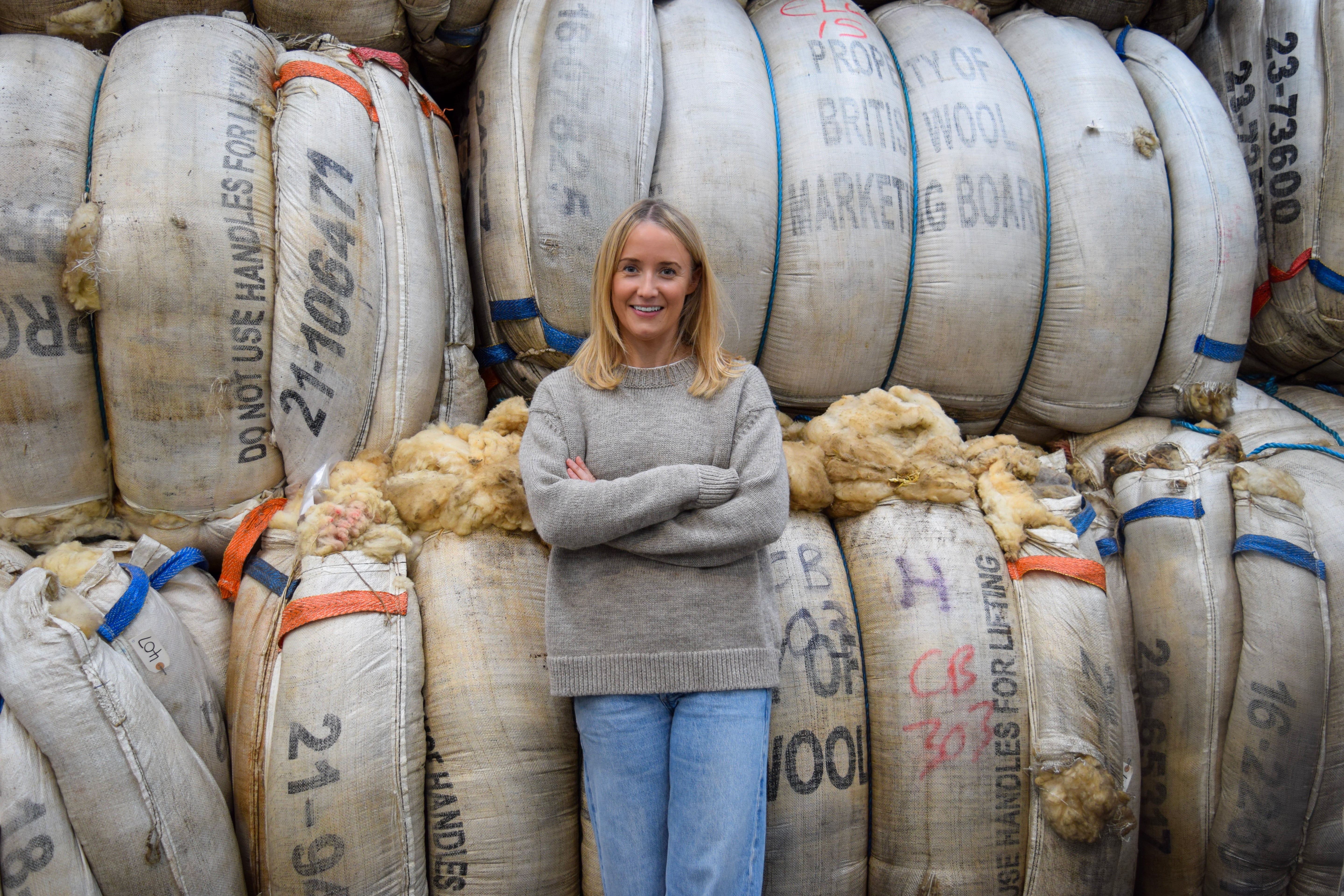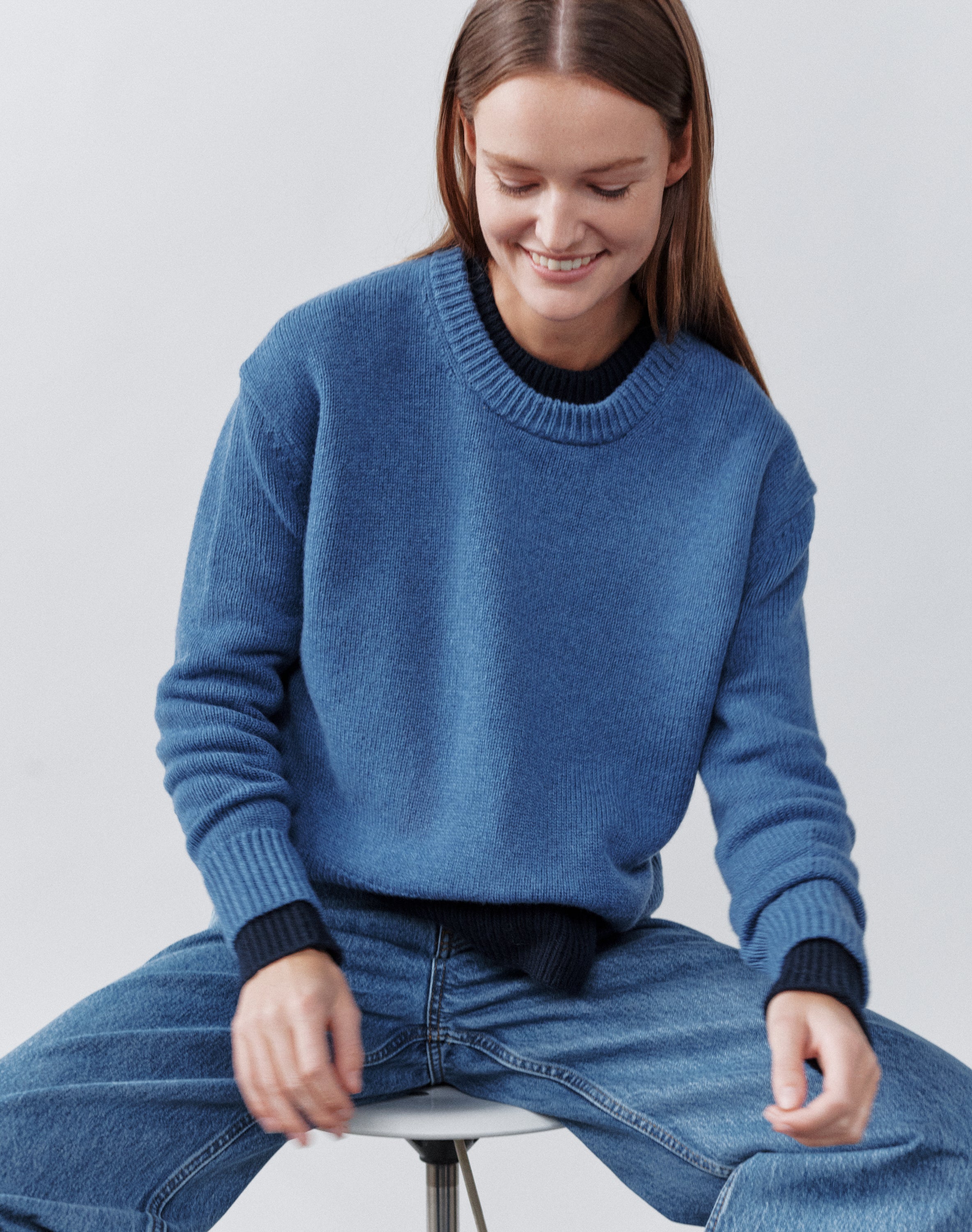The timeless combination of vintage denim and a classic knit. There's nothing better in our opinion.
Your favourite jeans tell a story. Whether it's the paint smudge from the time you decorated your first house or the creases that fit you perfectly. Apart from the story we wear into them, each pair has a history which, in parts, is less than glamourous.
In the early 20th Century denim was adopted as the preferred workwear fabric for cowboys, miners, and farmers in the US. It's durability, hardiness and cost earned it its favour amongst the working class. Slowly jeans made their way into the mainstream. They remain an iconic, timeless wardrobe staple. But as the fashion industry responds to greater consumer demand for sustainability and transparency, denim has come under intense scrutiny. Here are a few facts that we found pretty eye opening:
But as the fashion industry responds to greater consumer demand for sustainability and transparency, denim has come under intense scrutiny. Here are a few facts that we found pretty eye opening:
Water: Just one pair of jeans uses between 3,500 and 9,500 litres of water. Cotton is a very water-intensive crop (68% of this water is used in the growing process). During the manufacturing process denim is washed and rinsed multiple times. And of course, once the jeans reach us, they face a lifetime of cycles through the washing machine.
CO2: It’s estimated that one pair of jeans create 33.4 kg of CO2 throughout its lifetime. That’s the same as boiling a kettle more that 2000 times or taking the overground from London Bridge to Bond street 194 times.
Chemicals: From the farming to the production, denim has an affair with chemicals. Non-organic cotton is grown using pesticides and artificial fertilisers. These can be highly toxic, which is harmful to the cotton farmers, and they often pollute soil and water systems. But it doesn’t stop there, to create denim the cotton is dyed to get that classic indigo look, these dyes are often harmful and also pollute local water systems.
Hidden plastics: Your favourite stretch jeans may fit like a glove, but they probably contain a few sneaky ingredients. Elastane and polyester (fossil-based synthetic fibres) are often blended in with the cotton to give it that super stretch. Making these fibres emits harmful greenhouse gases, while washing these jeans will probably result in shedding micro-plastics which are bad news for the ocean. But don’t rush your stretch jeans to the bin – the blend of fibres makes them notoriously hard to recycle.
It paints a bit of a bleak picture. But there are steps you can take to ensure your next pair of jeans are good news for the planet. 1. Choose organic
1. Choose organic
Organic cotton is grown without the use of pesticides, herbicides and fertilisers; and it is often also rain fed, which means a reduction in the amount of water used to grow the crop.
Nudie Jeans use 100% Fairtrade organic cotton (meaning the workers get a fair wage too – an added bonus). Get yours here.
2. Shop local
Brands with long supply chains produce jeans with a higher carbon footprint, because all those miles add up. So whilst cotton isn’t usually grown in the UK, brands can localise their manufacturing and production processes to shorten the chain.
At Huit they’ve taken this concept to the next level by reviving an historic jeans factory in Wales. The do one thing well – making jeans to last.
3. Opt for recycled
Two billion pairs of jeans are produced a year. But we already have more pairs than we need, which is why many brands are finding ways of turning old jeans into new ones.
Each pair of MUD jeans are made with 40% recycled denim (the highest percentage currently available). The brand is the first circular denim brand, working with recycling experts to close the loop. Shop here.
E.L.V. Denim celebrate the journey and make a feature of the fact that each pair of jeans is made from a mix of others. Shop them here. 
4. Look for transparency
Not only is transparency in the supply chain important in verifying a brands sustainability practices, it also means that the way they treat their workers is front and central. No-one wants to invest in a good pair of jeans that have come from hardship and exploitation.
Outland Denim began as a way to provide dignified employment for survivors of sexual exploitation, this has widened to include those who have suffered from other forms of exploitation and abuse. They also operate a training scheme to upskill employees, use organic cotton, and conduct research in the areas of water purification, carbon footprint reduction, and zero-waste production. Get yourself a pair here.
5. Eco stretch
If you’re a fan of the stretch jean then look for a pair that use natural or recycled elastane and polyester. There’s a lot of innovation happening in the world of fashion when it comes to recycled polyester – some brands are even rescuing plastic bottles for this very purpose.
Italian denim mill Candiani have innovated a new biodegradable stretch denim made from plant-based fibres. Several brands have embraced this fabric including Huit and Denham.
Denham created a limited edition Candiani collection, which is no longer available, however they have promised a new collection using the special fabric soon. Shop their jeans here. Whichever you wear, take good care of them and they'll see you through many years. And of course, pair it with a really good jumper.
Whichever you wear, take good care of them and they'll see you through many years. And of course, pair it with a really good jumper.







